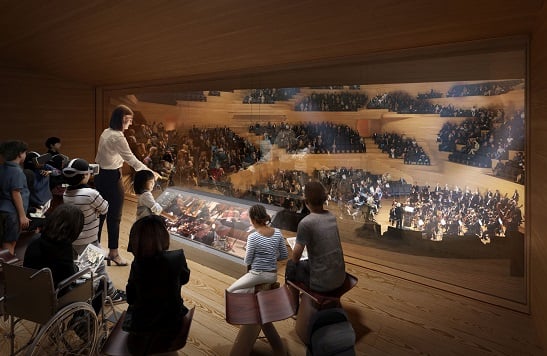
An artist's interpretation of one of the centre's planned 'education hubs'
£288m concert hall will be ‘the Tate Modern for music’
The proposed Centre for Music will operate without public subsidy after the Government decided it was too expensive.
A £288m concert hall planned for London will “transform the way music is made, discovered and shared,” partners behind the project say.
The Government decided in 2016 that the proposed Centre for Music, a 2000-seat auditorium and education centre, did not “offer value for money for taxpayers and is not affordable” after spending £1.25m. The remaining £4.25m set aside by Former Chancellor George Osborne for a business case was returned to the Exchequer.
Now the City of London has committed £1.95m to prepare a masterplan and explore a funding model for the facility, which will be built and run without ongoing public subsidy. A partnership between the city and stakeholders The Barbican, London Symphony Orchestra (LSO) and Guildhall School of Music and Drama says four floors of commercial office space, a restaurant, venue hire and ticket sales will “create a solid funding base for the future”.
READ MORE:
- Government pulls out of plans for new London concert hall
- City of London 'persuaded' to support concert hall scheme
“We believe the Centre for Music’s potential transformative power for music is equal to that of Tate Modern’s impact on the London visual arts scene.”
The centre will occupy the current Museum of London site after the museum reopens at Smithfield Market in 2024. Construction will take about four years.
‘Optimistic’ about fundraising
This latest commitment from the City of London brings its funding to date for the centre to nearly £7m. A 2015 feasibility study estimated the project’s cost at £278m but construction cost inflation has pushed the price tag up by £10m.
A City of London spokesperson said its funding will test a business case it has received from the Centre of Music “to ensure that assumptions are robust and risks are manageable” and explore alternatives if £125m cannot be privately fundraised.
The Centre for Music team says it is “optimistic” it can raise the capital costs, in part through future leases on the four commercial floors. Naming rights are being offered to a lead donor provided the building’s title is “appropriate to its profile within the City of London and its standing as an international cultural organisation”.
Early conversations with potential partners have been “encouraging”, a Centre of Music spokesperson said.
“We are confident that the private sector will play an important role in funding the centre.”
The spokesperson said the centre was being designed with the future of arts and cultural funding in mind: “unlike other cultural venues built in the past when public subsidies were more common, we’re building commercial spaces in from the start, which means we’ll be sustainable.”
Growing music's reach
The Barbican will run the new centre on the City’s behalf with LSO as its resident orchestra.
Guildhall’s Institute for Social Impact Research in the performing arts will also be based there. Education will be a fundamental part of the centre’s remit and give each of the partners space to grow their education and outreach work. It is estimated that learning activities, public events and concerts will make up roughly 70% of events, and commercial activity 30%.
The partners say that recent concert hall openings in Hamburg and Paris demonstrate the appetite for a world-class music venue in London: “outstanding new venues deliver an exponential increase in music audiences rather than take audiences away from other venues.”
Market analysis to support these claims is commercially sensitive and cannot be shared, the Centre for Music team said.
Join the Discussion
You must be logged in to post a comment.